外研版(2019)必修 第二册Unit 3 On the move Grammar & Vocabulary课件(共29张PPT)
文档属性
| 名称 | 外研版(2019)必修 第二册Unit 3 On the move Grammar & Vocabulary课件(共29张PPT) | 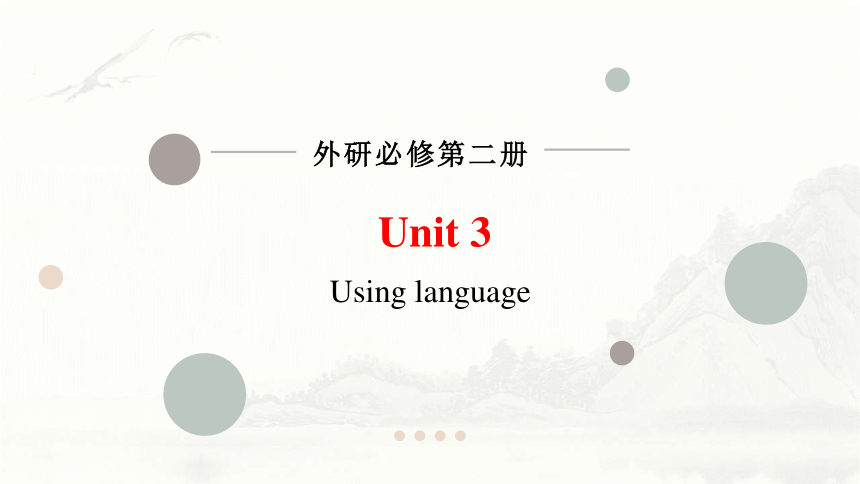 | |
| 格式 | pptx | ||
| 文件大小 | 381.5KB | ||
| 资源类型 | 教案 | ||
| 版本资源 | 外研版(2019) | ||
| 科目 | 英语 | ||
| 更新时间 | 2024-03-06 09:09:58 | ||
图片预览

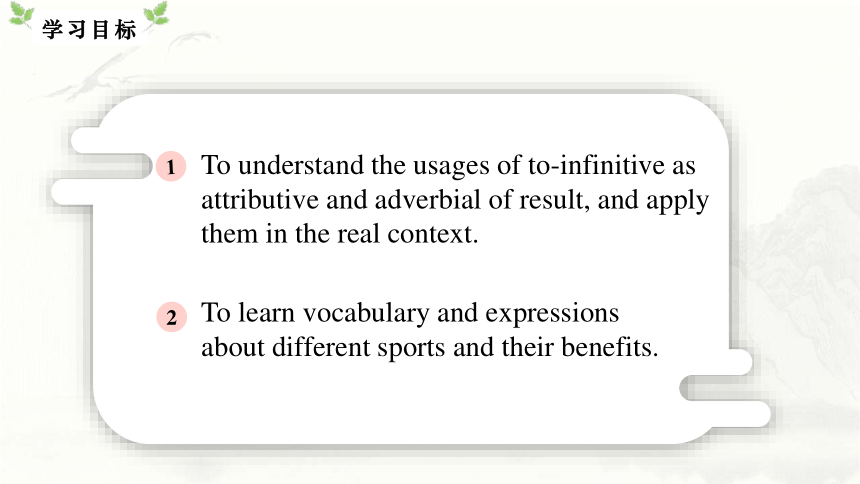
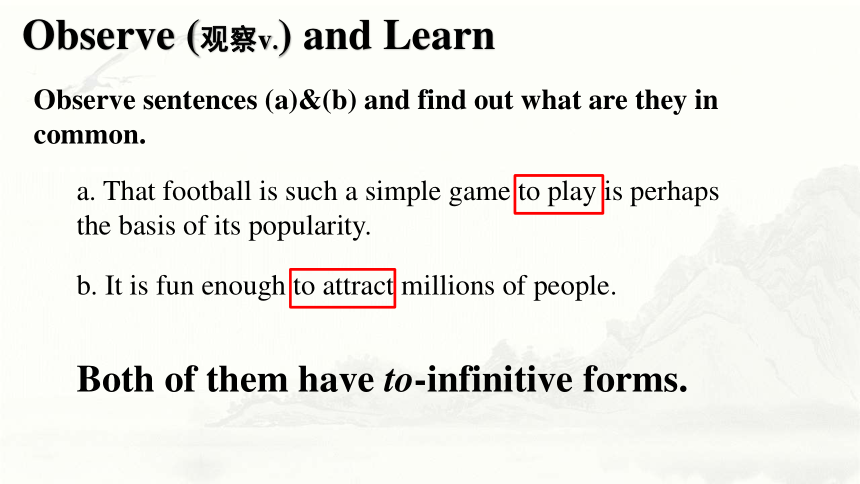
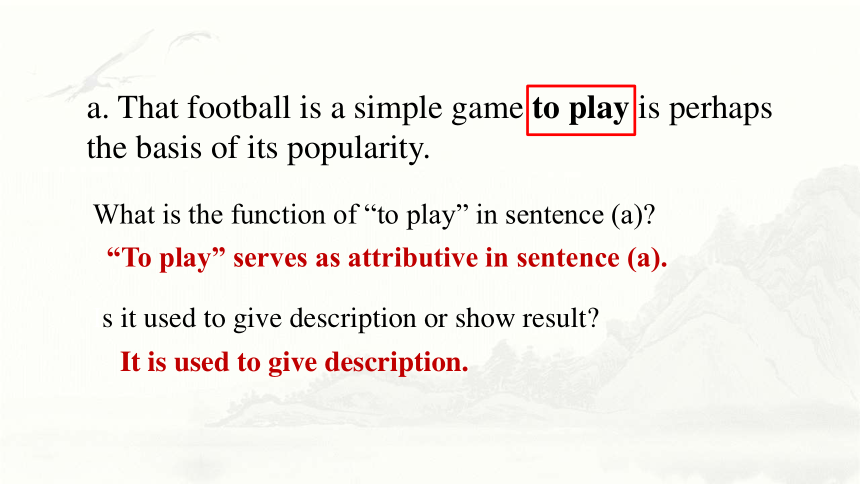
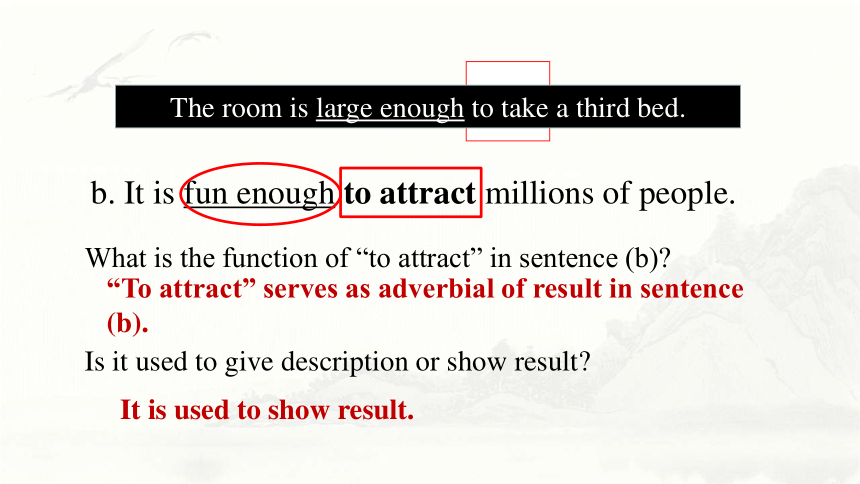


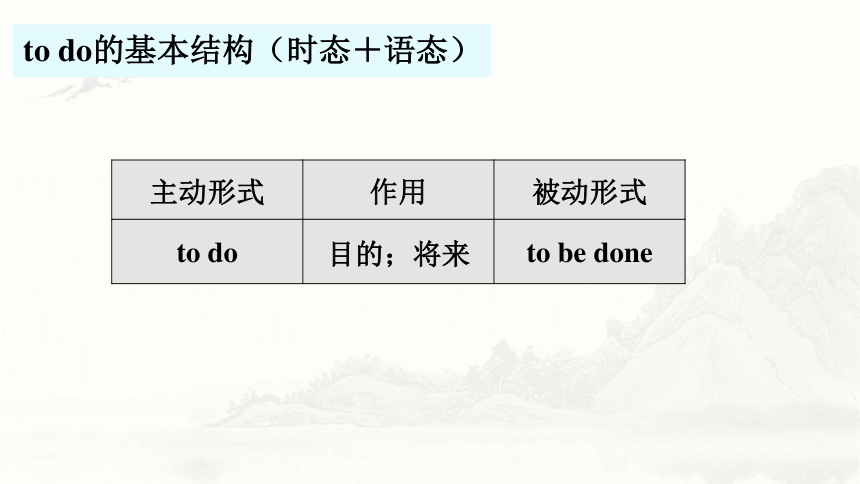
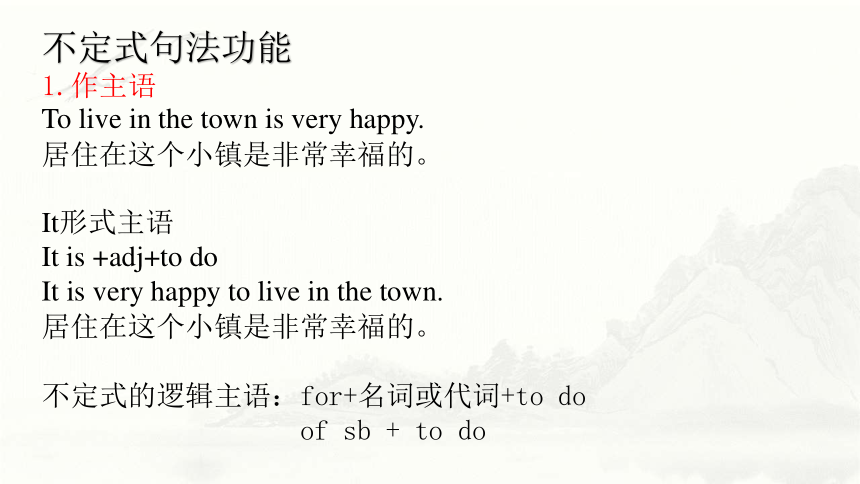
文档简介
(共29张PPT)
外研必修第二册
Unit 3
Using language
1
2
To understand the usages of to-infinitive as attributive and adverbial of result, and apply them in the real context.
To learn vocabulary and expressions about different sports and their benefits.
Observe sentences (a)&(b) and find out what are they in common.
a. That football is such a simple game to play is perhaps the basis of its popularity.
b. It is fun enough to attract millions of people.
Both of them have to-infinitive forms.
Observe (观察v.) and Learn
a. That football is a simple game to play is perhaps the basis of its popularity.
What is the function of “to play” in sentence (a)
Is it used to give description or show result
“To play” serves as attributive in sentence (a).
It is used to give description.
b. It is fun enough to attract millions of people.
What is the function of “to attract” in sentence (b)
Is it used to give description or show result
“To attract” serves as adverbial of result in sentence (b).
The room is large enough to take a third bed.
It is used to show result.
to-infinitive 不定式
定义:
表示动作的方向或趋势,除了谓语, 其他角色都能胜任(主语,宾语,表语,定语,状语...)。
to do的基本结构(时态+语态)
主动形式 被动形式
一般式 to do to be done
完成式 to have done to have been done
进行式 to be doing 无
完成进行式 to have been doing 无
to do的基本结构(时态+语态)
主动形式 作用 被动形式
to do 目的;将来 to be done
不定式句法功能
1.作主语
To live in the town is very happy.
居住在这个小镇是非常幸福的。
It形式主语
It is +adj+to do
It is very happy to live in the town.
居住在这个小镇是非常幸福的。
不定式的逻辑主语:for+名词或代词+to do
of sb + to do
It' s impossible for me to learn Math well.
对我来说学好数学是不可能的。
It' s kind of you to help me.
你来帮助我,你太好了。
for前的形容词指“事情”。如例句中的impossible是指学好数学这件事是不可能的。
of前的形容词多用来指“人的性格或行为表现”。如例句中的kind指你来帮我,你人很好。
指“人的性格或行为表现”+of:brave (勇敢的) careful (仔细的) foolish (愚蠢的) kind (好心的) rude (粗鲁的) thoughtful (周到的/体贴的)wise (明智的)
2.作宾语
动词+to do/not to do(不定式的否定在to前+not)
动词+疑问词+to do
动词+it+宾补+to do ( it是形式宾语,英语中的尾重原则)
I can' t bear to look back.
往事不能回首。
I promised not to tell about it.
我保证不给别人说。
Tell me when to go.告诉我啥时候走。
I find it difficult to understand my sister.
我发现我很难理解我姐姐.
3.作表语
The important thing is to save lives.
救人要紧。
4. 作定语
Everyone has right to speak.
毎个人都有説活的叔利.
I have a letter to write.
我有一封信要写
5.作状语
目的状语
I worked hard to live a better life.
我努力工作过上更好的生活.
条件状语
I will be glad to join you.
如果能加入你们我很开心。
原因状语
I was glad to See her yesterday.
因为昨天见了她,我很开心。
结果状语
He speaks too fast for me to follow.
他说话对我来说太快了,我跟不上。
I arrived at the station very early, only to find the train hadleft.
我很早就到车站了,去发现火车已经离开了。
(only to find表意想不到的结果)
6.补语
My mom won' t allow us to play on the street.
爸爸不允许我在街上玩。
某些动词后,不定式要省去to
①感觉动词: see、 watch, look、 observe、 hear, feel
I hear him sing a song.
(整个过程)我听见他唱了一首歌。
I hear him singing a song.
(正在进行)我听见他正在唱一首歌。
②使役动词:make,have,let,get,leave
My mother made me clean the floor this morning.
我的妈妈今天早上让我扫了地。
I have him repair the car.我让他修车。
注意:感觉动词和使役动词变被动的时候,需要加上to
He was seen to buy something in the shop yesterday.
他昨天被看见在商店买东西。
I was made to laugh.我被逗笑了。
③特殊搭配: had better(最好) would rather (宁愿)Might as well (倒不如) can't help but(禁不住/不得不)
We might as well finish up the cake.我们还是把蛋糕吃完吧。
I can' t help but feel a pang.我禁不住感到一丝悲痛。
7.同位语
Suddenly, I got the idea, to leave at once.突然,我有个想法,立刻离开。
8.插入语
To begin with(首先) To tell me the truth( 说实话)
To be frank/honest/brief (坦率/老实/简单地说)
To make a long story short (长话短说)
To make a long story short, he was wanted by the policemen.
长话短说,警察在通缉他。
特殊句型:
Why (not ) +do
Why pay to watch the movie
为什么要花钱看那部电影
Why not ask me for help 为什么不找我帮忙呢
不定式语态变化
不定式的主被动:取决于不定式和它的逻辑主语之间的关系.逻辑主语是不定式动作的发出者,不定式就用主动语态。逻辑主语是不定式动作的承受者,不定式就用被动语态.
一般式:主动 to do (要做/去做)
被动:to be done(要被做)
She seemed unhappy to meet us.她见到我们似乎不高兴。
(she是meet的发出者,用主动语态)
The machine needs to be repaired.这台机器需要被修理。
(machine是repair的承受者,用被动语态)
进行式:主动to be doing(正在做) (动作正在发生)
I happened to be cooking when he came back.
当他回来时,我碰巧正在做饭。
完成式:主动to have done(已经/之前做) (动作发生在谓语动
I am sorry to have bothered you.
我很抱歉打扰到你了。
(打扰发生在抱歉之前,故用to have done)
被动: to have have done已经/之前被做
It was an honor to have been invited by him.
被他邀请是一种荣幸。
(邀请发生在荣幸之前,且是被邀请,用have been done)
完成进行时: to have been doing(之前一直做) (动作发生在谓语动词之前并还会持续发生)
I seem to have been learning English for 10 years.
我似乎已经学了10年英语了。
(此句用的have been doing,暗示还会继续学下去)
I. My pets take me a lot of time_
A. look after B. to look after C. to look D. looking for
2. The medicine is_ three times a day.
A. tobe taken B. to take
C. to have taken D. to have been taken
3. -Is Bob still performing
-I am afraid not. He is said_the stage already, as he has become anofficial.
A. to have left B. to leave
C. to have been left D. to be left
4. The chair man thought_ necessary to invite Professor Smith to speak at the meeting
A. that B. it C. this D. him
5. When asked by the police, he said that he remembered___ at theparty, but not_
A. to arrive; leaving B. to arrive; to leave
c. arriving; leaving D. arriving; to leave
6. You were silly not__. your car.
A. to lock B. to have locked
C. Locking D. having locked
7. Volunteering gives you a chance_ __ lives, including your own.
A. change B. changing
C. changed D. to change
8. Let those in need___ that we will go all out to help them.
A. to understand
B. understand
C. Understanding
D. understood
9. The engine just won't start. Something seems__wrong with it.
A. to go B. to have gone
C. going D. having gone
10. Birds' singing is sometimes a warming to other birds__ away.
A. to stay B. staying
C. stayed D. stay
答案:
1-5BAABC
6-10BBDBB
外研必修第二册
Unit 3
Using language
1
2
To understand the usages of to-infinitive as attributive and adverbial of result, and apply them in the real context.
To learn vocabulary and expressions about different sports and their benefits.
Observe sentences (a)&(b) and find out what are they in common.
a. That football is such a simple game to play is perhaps the basis of its popularity.
b. It is fun enough to attract millions of people.
Both of them have to-infinitive forms.
Observe (观察v.) and Learn
a. That football is a simple game to play is perhaps the basis of its popularity.
What is the function of “to play” in sentence (a)
Is it used to give description or show result
“To play” serves as attributive in sentence (a).
It is used to give description.
b. It is fun enough to attract millions of people.
What is the function of “to attract” in sentence (b)
Is it used to give description or show result
“To attract” serves as adverbial of result in sentence (b).
The room is large enough to take a third bed.
It is used to show result.
to-infinitive 不定式
定义:
表示动作的方向或趋势,除了谓语, 其他角色都能胜任(主语,宾语,表语,定语,状语...)。
to do的基本结构(时态+语态)
主动形式 被动形式
一般式 to do to be done
完成式 to have done to have been done
进行式 to be doing 无
完成进行式 to have been doing 无
to do的基本结构(时态+语态)
主动形式 作用 被动形式
to do 目的;将来 to be done
不定式句法功能
1.作主语
To live in the town is very happy.
居住在这个小镇是非常幸福的。
It形式主语
It is +adj+to do
It is very happy to live in the town.
居住在这个小镇是非常幸福的。
不定式的逻辑主语:for+名词或代词+to do
of sb + to do
It' s impossible for me to learn Math well.
对我来说学好数学是不可能的。
It' s kind of you to help me.
你来帮助我,你太好了。
for前的形容词指“事情”。如例句中的impossible是指学好数学这件事是不可能的。
of前的形容词多用来指“人的性格或行为表现”。如例句中的kind指你来帮我,你人很好。
指“人的性格或行为表现”+of:brave (勇敢的) careful (仔细的) foolish (愚蠢的) kind (好心的) rude (粗鲁的) thoughtful (周到的/体贴的)wise (明智的)
2.作宾语
动词+to do/not to do(不定式的否定在to前+not)
动词+疑问词+to do
动词+it+宾补+to do ( it是形式宾语,英语中的尾重原则)
I can' t bear to look back.
往事不能回首。
I promised not to tell about it.
我保证不给别人说。
Tell me when to go.告诉我啥时候走。
I find it difficult to understand my sister.
我发现我很难理解我姐姐.
3.作表语
The important thing is to save lives.
救人要紧。
4. 作定语
Everyone has right to speak.
毎个人都有説活的叔利.
I have a letter to write.
我有一封信要写
5.作状语
目的状语
I worked hard to live a better life.
我努力工作过上更好的生活.
条件状语
I will be glad to join you.
如果能加入你们我很开心。
原因状语
I was glad to See her yesterday.
因为昨天见了她,我很开心。
结果状语
He speaks too fast for me to follow.
他说话对我来说太快了,我跟不上。
I arrived at the station very early, only to find the train hadleft.
我很早就到车站了,去发现火车已经离开了。
(only to find表意想不到的结果)
6.补语
My mom won' t allow us to play on the street.
爸爸不允许我在街上玩。
某些动词后,不定式要省去to
①感觉动词: see、 watch, look、 observe、 hear, feel
I hear him sing a song.
(整个过程)我听见他唱了一首歌。
I hear him singing a song.
(正在进行)我听见他正在唱一首歌。
②使役动词:make,have,let,get,leave
My mother made me clean the floor this morning.
我的妈妈今天早上让我扫了地。
I have him repair the car.我让他修车。
注意:感觉动词和使役动词变被动的时候,需要加上to
He was seen to buy something in the shop yesterday.
他昨天被看见在商店买东西。
I was made to laugh.我被逗笑了。
③特殊搭配: had better(最好) would rather (宁愿)Might as well (倒不如) can't help but(禁不住/不得不)
We might as well finish up the cake.我们还是把蛋糕吃完吧。
I can' t help but feel a pang.我禁不住感到一丝悲痛。
7.同位语
Suddenly, I got the idea, to leave at once.突然,我有个想法,立刻离开。
8.插入语
To begin with(首先) To tell me the truth( 说实话)
To be frank/honest/brief (坦率/老实/简单地说)
To make a long story short (长话短说)
To make a long story short, he was wanted by the policemen.
长话短说,警察在通缉他。
特殊句型:
Why (not ) +do
Why pay to watch the movie
为什么要花钱看那部电影
Why not ask me for help 为什么不找我帮忙呢
不定式语态变化
不定式的主被动:取决于不定式和它的逻辑主语之间的关系.逻辑主语是不定式动作的发出者,不定式就用主动语态。逻辑主语是不定式动作的承受者,不定式就用被动语态.
一般式:主动 to do (要做/去做)
被动:to be done(要被做)
She seemed unhappy to meet us.她见到我们似乎不高兴。
(she是meet的发出者,用主动语态)
The machine needs to be repaired.这台机器需要被修理。
(machine是repair的承受者,用被动语态)
进行式:主动to be doing(正在做) (动作正在发生)
I happened to be cooking when he came back.
当他回来时,我碰巧正在做饭。
完成式:主动to have done(已经/之前做) (动作发生在谓语动
I am sorry to have bothered you.
我很抱歉打扰到你了。
(打扰发生在抱歉之前,故用to have done)
被动: to have have done已经/之前被做
It was an honor to have been invited by him.
被他邀请是一种荣幸。
(邀请发生在荣幸之前,且是被邀请,用have been done)
完成进行时: to have been doing(之前一直做) (动作发生在谓语动词之前并还会持续发生)
I seem to have been learning English for 10 years.
我似乎已经学了10年英语了。
(此句用的have been doing,暗示还会继续学下去)
I. My pets take me a lot of time_
A. look after B. to look after C. to look D. looking for
2. The medicine is_ three times a day.
A. tobe taken B. to take
C. to have taken D. to have been taken
3. -Is Bob still performing
-I am afraid not. He is said_the stage already, as he has become anofficial.
A. to have left B. to leave
C. to have been left D. to be left
4. The chair man thought_ necessary to invite Professor Smith to speak at the meeting
A. that B. it C. this D. him
5. When asked by the police, he said that he remembered___ at theparty, but not_
A. to arrive; leaving B. to arrive; to leave
c. arriving; leaving D. arriving; to leave
6. You were silly not__. your car.
A. to lock B. to have locked
C. Locking D. having locked
7. Volunteering gives you a chance_ __ lives, including your own.
A. change B. changing
C. changed D. to change
8. Let those in need___ that we will go all out to help them.
A. to understand
B. understand
C. Understanding
D. understood
9. The engine just won't start. Something seems__wrong with it.
A. to go B. to have gone
C. going D. having gone
10. Birds' singing is sometimes a warming to other birds__ away.
A. to stay B. staying
C. stayed D. stay
答案:
1-5BAABC
6-10BBDBB
